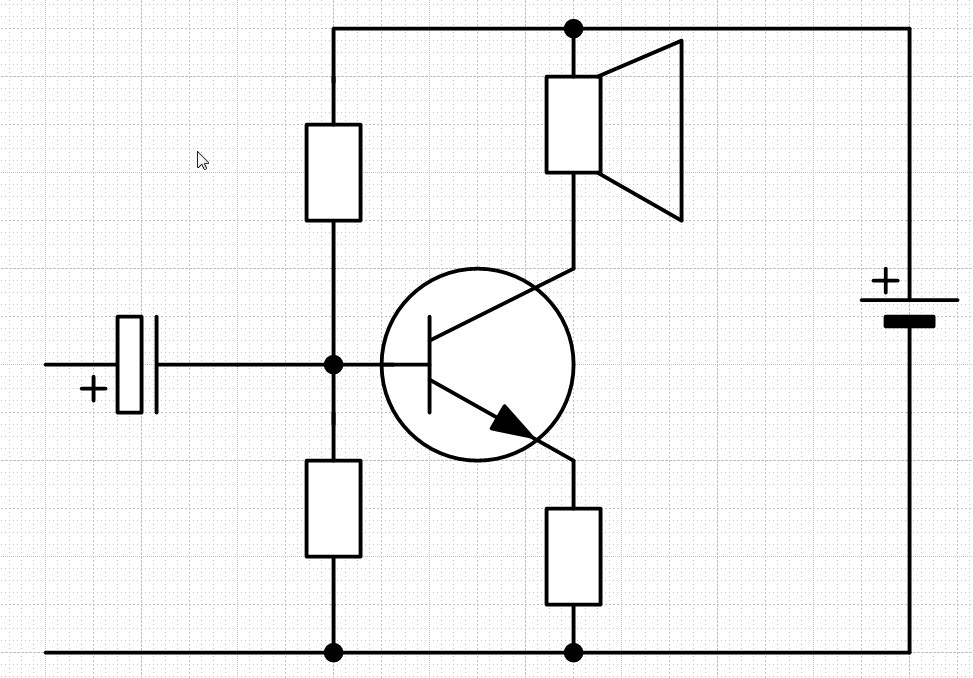I am trying to learn about audio electronics and built a simple single stage amplifier with a 2N3904 transistor. I play the guitar and know that when you plug an amp into a speaker it's impedance has to match. I calculated the output impedance of the circuit by measuring the open voltage and then adding a resistor to the circuit until that Voltage was halved. This gave me 15k ohms. I have a small .5W 8ohm speaker. How do these to things correlate? Do I need to change the circuit to make the output impedance 8ohms or am I not understanding correctly?
-
\$\begingroup\$ The impedance matching requirement for guitar amps is due mostly to limitations of the vacuum tubes often used in their power amplifier stages. Solid state amplifiers often have a far lower output impedance than the impedance of the speaker they are driving. In your case, the high output impedance of the amplifier is going to severely limit its ability to drive the speaker, but shouldn't cause any harm. \$\endgroup\$– esilkCommented Mar 1, 2019 at 21:31
-
\$\begingroup\$ I'm assuming from what you've written that your BJT amplifier stage is just a common emitter stage with the output taken from the collector and, since you built it and tested it, that it's designed well enough. Per your testing, you can well imagine what would happen if you loaded it down with a low impedance speaker. And even if you did redesign it to greatly lower the output impedance (new BJT type too), it will only actively "pull downward" via the BJT. The collector resistor will passively "pull upward." That's another problem. Many audio amps are three stages, sometimes more, rarely less. \$\endgroup\$– jonkCommented Mar 2, 2019 at 21:48
3 Answers
With a 15K ohm output impedancde your amplifier would be able to drive that lousspeaker in any noticeable way.
You've built a signal amplifier, you can use it to amplify line level signals (like line out on a cd player), maybe even your guitar.
-
\$\begingroup\$ I think you mean "would [not] be able to drive". \$\endgroup\$– DKNguyenCommented Mar 1, 2019 at 21:26
Sorry, but you have totally missed a few things:
- how much gain and power output capability is needed for decent guitar amplification
- how transistor amplifiers with the needed capablities are constructed and how they function as circuits
- what amplifier's speaker impedance rating mean
If an amp is rated for 8 Ohm speaker, inserting for ex. 4 Ohm speaker can cause overheating in the amp and having more, say 16 Ohm gives less power and can also cause instability, if the amp has an output transformer like tube amps generally have.
With 2N2904 you can construct an amp which outputs theoretically 150 mW. It's a common emitter amplifier stage with about 3,5V operating voltage:
This circuit wastes continuously DC power as much as it can output, its so inefficient that I do not recommend to build it except as a test for "have you learned enough of the math of basic electronics to get the parts calculated right"
-
\$\begingroup\$ Thanks for the response. I'm not trying to build a guitar amplifier at the moment, I am just trying to learn how transistors work and how they amplify a signal. This is just a learning experiment and I happened to have a small speaker laying around from a kit that I thought I might hook it up to. \$\endgroup\$– shark38jCommented Mar 1, 2019 at 21:33
-
\$\begingroup\$ This circuit will also destroy many speakers. Speakers should always be AC-coupled. \$\endgroup\$– HearthCommented Mar 2, 2019 at 0:25
If you show your circuit, you will get better advice. The circuit output impedance does not have to be exactly 8 ohms, but lower is better for energy transfer.
A 3904 is a small signal transistor, so no matter what you do you will not get very much volume. You will get more if you put a transformer between your circuit and the speaker. The transformer will transform (!) the relatively high voltage, low current signal at the transistor's collector to a lower voltage/higher current signal better matched to the speaker's low impedance. Small audio output transformers are available through Digi-Key, Mouser, and other distributors. OR, find a small/cheap/old transistor radio and cannibalize it.

